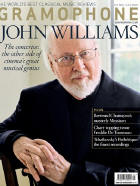Texte paru dans: / Appeared in: |
|
|
Outil de traduction |
|
|
‘Battle Cry’ – it’s an arresting title for an equally arresting album, the solo recital debut from mezzo Helen Charlston. She’s joined by regular collaborator Toby Carr, whose theorbo supplies the textural bridge across centuries, connecting the likes of Monteverdi, Purcell and Strozzi to a new song-cycle by Owain Park. As for the battle cry of the title, it comes in female form. The recording offers a response – a roar, a lament, a hope – for all the women whose abandoned, betrayed and too often dead bodies are strewn through the history of opera and song. Philomela is here, Dido, Ariadne, but also warrior-queen Boudicca and poet Sappho.
These characters come alive in Charlston’s flexible mezzo, surely one of the most exciting voices in the new generation of British singers. The intelligence of the programming is matched in that of her delivery – legatos always reaching beyond the individual phrase for the horizon, articulation that pulls us up short, swift shifts of tone and colour that catch the mercurial play of musical light through Strozzi’s monologues or the battling emotions of Monteverdi’s Arianna.
There’s an androgynous quality to Charlston’s tone that allows her to play with and against expectations of gender: sternly dignified in Purcell’s ‘O lead me to some peaceful gloom’, all queenly poise in Dido’s Lament, softening into sensuality in the swaying rhythms and flexible phrases of Strozzi’s L’Eraclito amoroso before taking us to the brink of disintegration in the final two of Park’s songs.
Giving its title to the album, this new cycle setting texts by Georgia Way is both an answer to the Baroque repertoire and an opening gambit. Can songs for theorbo and voice offer something to a new century? Park starts by looking to the past, nodding to Purcell and Strozzi’s circling ground basses in ‘Boudicca’ while the voice leaps, clashes and thrusts: a baroque song that has warped over time into something bolder, stranger. Free-form verses and a folk song-like refrain catch the collision of innocence and traumatic self-discovery in ‘Philomela in the Forest’, while in ‘A Singer’s Ode to Sappho’ the theorbo falls away altogether, letting the voice dart and pace and roam on its own terms. It’s a striking piece of musical theatre.
Throughout, Carr’s theorbo is an expressive partner for Charlston – a graceful foil in solos by Kapsberger and de Visée, a springboard and conspirator in the songs. It’s an instinctive partnership, one to follow in the future. You get the strong sense from this superb recording that they’re only just getting started. |
|




